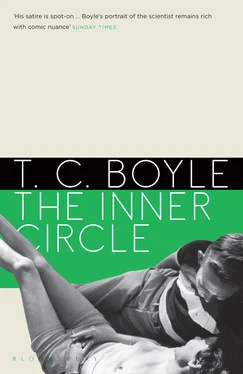“I don’t know,” I said. “I guess so.”
She was silent again, but she never took her eyes off me. I heard the distant sound of a phonograph, a single faint violin rising up out of the declension of the hour and then fading away again, and I remember being transported in that moment to another place, an apartment down the block, people gathered there, the last cocktail of the night, the low incestuous buzz of voices. “I have news too,” she said.
My mouth tried to close round the words, but my mind was already leaping ahead. “You, that’s right, you went to the, the—”
“The doctor,” she murmured, and she was smiling like all the angels in heaven.
Prok was already at his desk when I got to work the following morning, and he lifted his eyebrows as I came in, ten minutes late. To Prok, every second lost was a second the project was delayed, and if he’d kept us all out till one in the morning, it was hardly an excuse to get lax about our responsibilities. Mrs. Matthews was there in the anteroom, punctual as a banker, her back arched and chin up, typing. Corcoran was at his desk too, and Rutledge, who’d be going back to Princeton that afternoon to begin making his personal arrangements, was in the corner, head down, perusing one of the volumes Prok had given him so that he could keep abreast of the literature in the field. Ten past eight in the morning and the office was humming along as usual. With the exception of me, that is. I wasn’t at my best — hungover, depleted, and late on top of it — but I was ringing like a bell with the news.
Iris and I had stayed up to celebrate — I broke out a bottle of I.W. Harper I’d been saving for the occasion and touched glasses with her, though she was confining herself to ginger ale, already concerned for the baby’s welfare — and then we went to bed and I let my excitement spill into her, closing my eyes against the shadows playing across the wall and fighting down the image of the brunette and Corcoran, my wife in my arms and nobody but. My fertile wife. My pregnant wife. Two years of trying and I have to admit I was beginning to think it would never happen, that we were cursed somehow, and as I saw the child denied me I wanted it all the more, no matter the cost or the inconvenience or anything else. Prok wanted it too. And Iris’s mother — she wanted it — and Tommy wanted it and my own mother and just about everybody else we knew or came into contact with, from the butcher to the greengrocer. When are you two going to settle down and start a family? — that was what they wanted to know, what with every woman in America pregnant or pushing an infant in a stroller while an ex-serviceman strutted at her side.
“Sorry I’m late, Prok,” I said, snagging my hat and trench coat on the clothes tree behind my desk. The coat was wet — the temperature had dropped twenty degrees overnight and it was spattering rain — and my heel prints left gleaming arcs on the linoleum tiles. “But I had to stop by Iris’s school and tell them she wasn’t coming in today.”
Prok glanced up sharply. We were working on the text of the male volume now, and he was driving himself through sixteen- and seventeen-hour days, puzzling over the figures, pushing through organization to interpretation, and he’d become increasingly rigid under the pressure of it. He’d been up till one himself, and though he must have been feeling elated over the finalizing of the Rutledge situation and the success of the previous night’s demonstration, he might have been just the smallest bit under the weather too. “You’re holding up the project, Milk,” was all he said, and he gave me a sour look.
Normally I would have been mortified — I hated for anyone to question my devotion and loyalty, especially Prok, to whom I owed everything, and he was in the right, of course: I was late, I was irresponsible, I was holding up the project — but I felt an almost otherworldly sense of well-being, as if nothing could touch me, not fear or disease or recrimination. No reply was called for, but I had one at the ready, and I held it a moment to tease out the pleasure of it. I didn’t move. Just stood there at my desk, gazing out over the sanctuary of the office, the golden pools of lamplight, the galls, Prok. Iris was home in bed, too sick to go in and minister to her seven-year-olds. I’d listened to her retching over the toilet. I’d held her hand and wrapped her in a quilt and put her back to bed with dry toast and a glass of leftover ginger ale. “I have news, Prok,” I said. “Good news, great news.”
He’d already dropped his eyes to the page, and now they came up again, searching and hard. The pulsing arrhythmic din of Mrs. Matthews’s typewriter choked off on the downstroke. Corcoran looked up from his desk.
“It’s Iris,” I said, and I felt inflated, bigger than life, the actor, the hero, the marathoner at the tape. I knew what they must have thought of me. I was the youngest, the least-trained, Prok’s puppet, unable even to perform the most elemental biological function of them all, but that was all behind me now. Now I was anybody’s equal. I was a man, and wasn’t this the very definition of it? “She’s, well, we’re going to have a baby,” I said. “She’s pregnant.”
Prok let out a low whistle. Mrs. Matthews — she was in her fifties, a grandmother and a widow — gave me a melting look. And Corcoran, from his desk in the back room, put two hands together in a smatter of applause, which brought Rutledge’s head up out of his book in time to give me a quizzical glance.
“We found out last night. Yesterday, I mean. When I got home, after the, the—”
Prok had already crossed the room, grinning wide. He seized both my arms and held me in his grip till the familiar scent of him — of soap, astringents, the faintest whiff of witch hazel — penetrated me. “But you’ll need advice — you’ll need Mac,” he was saying, looking beyond me to the clock on the wall as if the baby were due in the next fifteen minutes. “And a good obstetrician. Whom did you say she was seeing? Because I have just the man—”
Unfortunately, as it turned out, I was away with the team much of that fall and winter, and as often as not Iris had to endure her bouts of morning sickness alone. She wasn’t due till June, and so we both agreed that she would fulfill her obligations at the elementary school as long as she could — it was the right thing to do, of course, but we were also in need of the money because now we would have to move to a bigger place, and my raise at the Institute had yet to come through, though I was sure it would once the grant situation was ironed out. When I was home I did my best to help out around the house, preparing meals at night, washing up, laying out her clothes for the morning. She was brave about it, never once complaining over my schedule — it was a fact of life at this stage, a fait accompli — and I remember the way she pushed herself up stiffly from the table in the mornings, her face clenched as she tried to keep down half a soft-boiled egg and three sips of coffee.
I felt bad about it. And I would have been happy to stay home with her, to help see her through it, to be with her and share the wonder of the transformation going on inside her, but this was a crucial time for the project. We’d managed to reach a milestone the year before — ten thousand histories in the books — and yet Prok kept pushing frantically for more as he got deeper into the writing up of the results, afraid of having the figures attacked for being skewed in one direction or another (“We have five hundred and five female alcoholics,” he would mutter, “but a paltry smattering of upper-level blacks and virtually nothing on ministers, rabbis and the like, not to mention drug addicts and traveling salesmen”). To complicate matters, we were still working shorthanded, as Rutledge wouldn’t complete his dissertation and join us till just before the holidays, so while Iris put on weight and felt her breasts grow tender and her feet leaden, we were bouncing from city to city, Prok lecturing nearly every day, and the three of us staying up into the wee hours recording histories. We went to Chicago, Philadelphia and Washington and any number of smaller municipalities along the way, and we were in residence at the Astor Hotel in New York for nearly three weeks in December, interviewing a succession of male hustlers and female prostitutes.
Читать дальше












